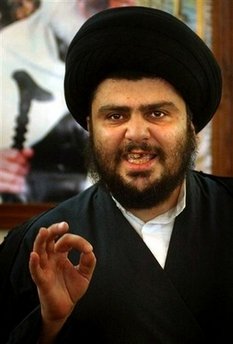
The Mahdi Army, a Shiite militia led by Iraqi radical cleric Muqtada al-Sadr, has re-emerged as a key force in Iraqi politics. Sunnis believe his militia is responsible for the kidnapping and killing of thousands of Sunnis over the past few months. Now a plan to shift more U.S. troops to Baghdad to deal with the worsening violence there is seen as putting the American military on a crash course with al-Sadr, shown here in an Aug. 9, 2004, file photo. (AP Photo/Hadi Mizban, File)
Al-Sadr’s black-clad followers insist they simply protect Shiite communities that have suffered horrific losses at the hands of Sunni insurgents and religious extremists such as al-Qaida in Iraq since the collapse of Saddam Hussein’s Sunni-dominated regime in 2003.
To put an end to the sectarian killings, President Bush on Tuesday approved a new plan to increase U.S. and Iraqi forces in Baghdad.
“Obviously the violence in Baghdad is still terrible and therefore there needs to be more troops,” Bush said at a White House press conference with al-Maliki.
That will inevitably mean a showdown with al-Sadr and his followers – believed to be the largest and most active Shiite militia in Iraq.
“If you don’t do this, you end up with a situation like you have in Lebanon, where the militia becomes a state within a state,” the top U.S. commander in the Middle East, Gen. John Abizaid, said in an interview this week with National Public Radio.
“It makes the state impotent to be able to deal with security challenges,” he said.
Coalition forces already have begun moving against the Mahdi Army. In the last month, British troops have arrested the Mahdi commander in the southern city of Basra. And American soldiers killed 15 militiamen in a gunfight 40 miles south of the capital last weekend.
U.S. and Iraqi forces have staged at least two major raids this month in Sadr City, the Mahdi Army’s Baghdad stronghold.
Like Hezbollah in Lebanon, the al-Sadr movement runs social services ranging from caring for widows and orphans to burying unclaimed bodies in Baghdad and other cities.
The parallels with Hezbollah reflect the network of clerical-led Shiite groups throughout the Middle East, which have been gaining strength due to the rise of both Iran and the Shiite community in Iraq.
Al-Maliki’s opposition to Israel’s attacks against Hezbollah in Lebanon is a sign of the network’s influence in a changing Middle East.

Wild Thing’s comment…….
I think the US forces would welcome a showdown with al-Sadr since every time they take on a group of his terrorists, they crush them.
Sadr runs an insurgency out of a Mosque. It’s time to obliterate this citadel with a MOAB. Why waste American deaths on this animal by assaulting with foot soldiers in the false belief that we don’t want to offend Shia Muslims. We should offend them with unbelievable force.

This should have been taken care of prior to handing back control to Iraq. It was a decisive point in the war when al-Sadr was allowed to go free, now that decision is being paid for. They had him once and he played “King X” and they let him go because he was holed up in a mosque. Drop that MOAB, they’ll still hate us either way!!!
Exactly Jack, when oh when will people realize what you said. ugh!
And you thought the British had bad teeth!!!
along with a bad case of Dragon breath….
WT this is off post but what the heck its friday
I found this site by accident,you need to check
out the first post called Walkie-Talkie
http://pasadenapundit.com/ Try to keep a dry
eye on this one!!!! got to go fish are calling!!
Tincan Sailor I am sitting here crying, thank you for the link. What a beautiful post that was. Thank you soooo much.